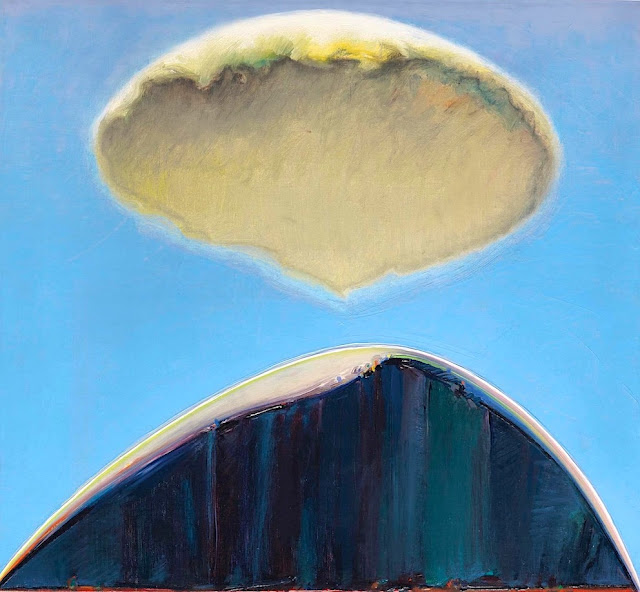El Capitan (2,309m - 7,573 ft)
United States of America
In Mount and Cloud, 1972, oil on canvas 20 1/4 x 22 in.
The painter
Morton Wayne Thiebaud was
an American painter known for his colorful works depicting commonplace
objects—pies, lipsticks, paint cans, ice cream cones, pastries, and hot
dogs—as well as for his landscapes and figure paintings. Thiebaud is
associated with the pop art movement because of his interest in objects
of mass culture, although his early works, executed during the fifties
and sixties, predate the works of the classic pop artists. Thiebaud used
heavy pigment and exaggerated colors to depict his subjects, and the
well-defined shadows characteristic of advertisements are almost always
included in his work.
Thiebaud was averse to labels such as "fine art" versus "commercial art" and described himself as "just an old-fashioned painter". He disliked Andy Warhol's "flat" and "mechanical" paintings and did not consider himself a pop artist.
In addition to pastries,
Thiebaud painted characters such as Mickey Mouse as well as landscapes,
streetscapes, and cityscapes, which were influenced by the work of
Richard Diebenkorn. His paintings such as Sunset Streets (1985) and
Flatland River (1997) are noted for their hyper realism, and have been
compared to Edward Hopper's work, another artist who was fascinated with
mundane scenes from everyday American life.
In 1962, Thiebaud's
work was included, along with Roy Lichtenstein, Andy Warhol, Jim Dine,
and Robert Dowd, in the historically important and ground-breaking "New Painting of Common Objects"
curated at the Pasadena Art Museum. This exhibition is considered to
have been one of the first Pop Art exhibitions in the United States.
These painters were part of a new movement, in a time of social unrest,
which shocked the U.S. and the art world.
The mountain
El Capitan (2,309m - 7,573 ft) is a vertical
rock formation in Yosemite National Park, located on the north side of
Yosemite Valley, near its western end. The granite monolith extends
about 3,000 feet (900 m) from base to summit along its tallest face and
is one of the world's favorite challenges for rock climbers.
The formation was named "El Capitan" by the Mariposa Battalion when it explored the valley in 1851. El Capitan ("the captain") was taken to be a loose Spanish translation of the local Native American name for the cliff, variously transcribed as "To-to-kon oo-lah" or "To-tock-ah-noo-lah".
It is unclear if the Native American name referred to a specific tribal chief or simply meant "the chief" or "rock chief". In modern times, the formation's name is often contracted to "El Cap", especially among rock climbers and BASE jumpers.
The top of El Capitan can be reached by hiking out of Yosemite Valley on
the trail next to Yosemite Falls, then proceeding west. For climbers,
the challenge is to climb up the sheer granite face. There are many
named climbing routes, all of them arduous, including Iron Hawk and Sea
of Dreams, for example.
The Nose was first climbed in 1958 by Warren Harding, Wayne Merry and
George Whitmore in 47 days using "siege" tactics: climbing in an
expedition style using fixed ropes along the length of the route,
linking established camps along the way.
In September 1973, Beverly Johnson and Sibylle Hechtel were the first
team of women to ascend El Capitan via the Triple Direct route.
_______________________________
2022 - Wandering Vertexes...
by Francis Rousseau

No comments:
Post a Comment